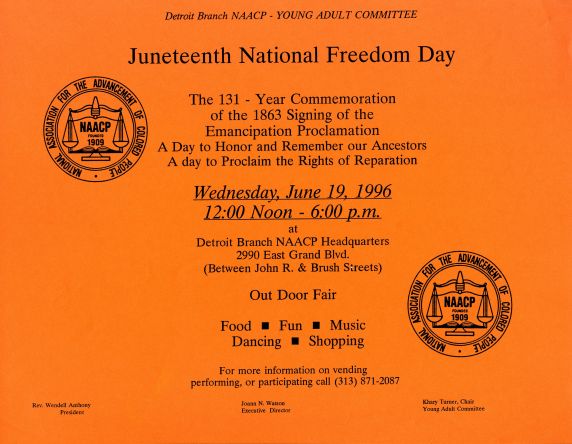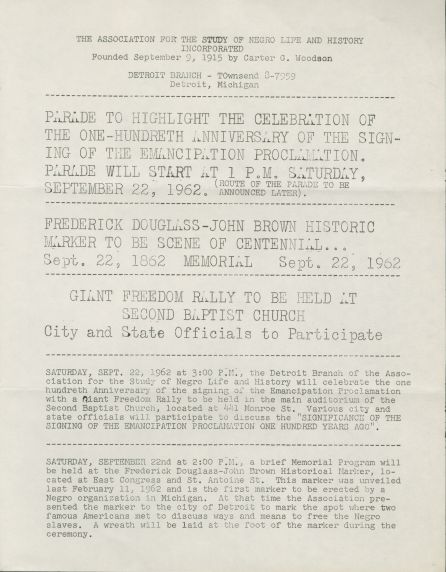Juneteenth - A celebration of freedom since 1865
President Lincoln is popularly given credit for freeing enslaved people in the United States with the Emancipation Proclamation. Though he personally did not support the use of slavery, his reasons for creating this proclamation were seen as more political and military than out of an advocacy for human and civil rights. His order, given as President and Commander in Chief of the military, did free people being held as slaves, but only in states that were in active rebellion against the Union. The Emancipation Proclamation gave military forces the authority and power to liberate slaves as they continued to gain ground in the South states.
But what does this have to do with Juneteenth? What is Juneteenth you might ask?
Juneteenth (June + 19th) commemorates the day of June 19, 1865 when Union troops arrived in Galveston, Texas where Major General Granger read out General Orders on how issues of law and order would be conducted forthwith. These orders included General Order #3, which stated:
"The people of Texas are informed that in accordance with a Proclamation from the Executive of the United States, all slaves are free. This involves an absolute equality of rights and rights of property between former masters and slaves, and the connection heretofore existing between them becomes that between employer and free laborer."
Two and a half years after the Emancipation Proclamation went into effect on January 1, 1863, Texas was the last state to officially receive word and federal enforcement of Lincoln's proclamation. June 19th has gained recognition as an anniversary to celebrate the day that all American slaves were finally, legally free.
Juneteenth celebrations in Texas started an annual commemoration of this day, bringing together former slaves and their descendants. However, along with repressive measures that began to appear throughout the South in response to the freedoms granted to Black individuals in the South, resistance to these events made finding public spaces to gather difficult. Emancipation Park in Houston and Booker T. Washington Park in Mexia are two examples of Texas parks that were legally purchased by Black communities in those areas to guarantee places for Juneteenth commemorations.
September 22, 1962 Emancipation Proclamation Centennial Celebration flyer sponsored by the Detroit Branch of the Association for the Study of Negro Life and History.
Juneteenth in Detroit
Due to the slow progress of the Emancipation Proclamation and its spread throughout the South, there is no shortage of dates that could be celebrated as commemorations of 'freedom'. September 22 marks President Lincoln's preliminary issuance of the Emancipation Proclamation. On September 22, 1962, Detroit organizations including the Detroit Branch of the Association for the Study of Negro Life and History sponsored a centennial Freedom Parade and Rally. Even with all of these other strong choices, June 19th continues to endure as a day of celebration of freedom, in part due to tradition, but also because many celebrants understand the importance of commemorating the day the last slave in the United States was freed, rather than the first.
Though it has experienced bouts of decline and resurgence over the past 152 years, it continues to be celebrated, not only in Texas but across America. The spread of this holiday to other states is often credited to a number of different circumstances, including the post-Civil War move of Black families north, the Civil Rights movement and more specifically the Poor Peoples March to Washington in 1968, as well as promotion by state governments and organizations including museums who host events and celebrations each year.
Since the 1970s, Juneteenth has found increasing popularity and notice across the country.
In Detroit, large-scale celebrations and events appear to begin in the early 1990s. For the first time in 1993, the Young Adult Committee of the Detroit Branch of the NAACP hosted Juneteenth National Freedom Day Celebrations. In later years they sometimes hosted events with partners like the Detroit Democratic Club encouraging attendees to 'Get Out the Vote' or panel discussions rather than the more traditional means of celebrating with food and music. The Henry Ford Museum/Greenfield Village also begun to host Juneteenth events during the 1990s. Over two decades later, and Juneteenth celebrations continue to be held each year in the Detroit area!
Some important dates in the history of Juneteenth:
1867: First celebration in Austin, TX under direction of the Freedman's Bureau
1872: Emancipation Park in Houston, TX becomes a celebration site
1898: Booker T. Washington Park becomes a celebration site
1920s: The term "Juneteenth" begins appearing in Black newspapers for the first time
1961-1973: No official observation of Juneteenth holiday in Fort Worth, TX due to decline in popularity, until revived in 1974
1979: Representative Al Edwards introduces legislation that makes Juneteenth a state holiday in Texas, the first state to pass this legislation.
1990s: Juneteenth events begin to appear in Detroit newspapers and in the NAACP Detroit Branch Records housed at the Walter P. Reuther Library!
1997: Websites are launched to disseminate information about the holiday
2005: State Senator Marsha G. Scoot proposes successful legislation to make Juneteenth a state holiday in Michigan
2012: Release of the U.S. Department of State Trafficking in Persons Report on June 19th to remind everyone that while we celebrate Juneteenth as the end of slavery in the United States, slavery continues to exist around the world.
2014: U.S. Senator Carl Levin (of Michigan) proposes successful Senate Resolution 474 designating June 19, 2014 as Juneteenth Independence Day
2017: Juneteenth begins to appear on Apple calendars as a holiday
Related collections and materials at the Reuther Library:
Equality and Civil Rights Activism in America Gallery
Norman McRae Papers
NAACP Detroit Branch Records
Jerome P. Cavanagh Papers
Wayne State University Emancipation Centennial Committee Records



 Reddit
Reddit Facebook
Facebook LinkedIn
LinkedIn